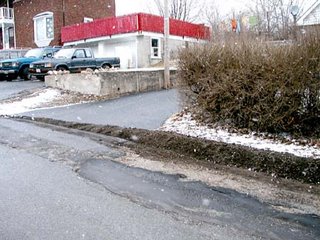Think Big by Thinking Local
Let's assess:
Kingston needs to become less reliant on government jobs. Why? Because they are largely out of our control. They cut back, they move, and they are subject to political whims. We need to stop looking at the lowest possible form of job-creation - call centers - as a solution. Why? Because these jobs necessarily seek out markets with high unemployment as a way of keeping costs low. When our people demand too much call center companies will simply cut and run for the next city offering up their desperate unemployment rate.
Kingston needs to create diverse products, services and events within the city. Why? In order to stop our citizens from traveling to other centers for the variety that we refuse to provide. When they leave, they take their money with them. We need to grow our local business interrelationships, create incentives to buy local, and incubate new ventures that are based in and around our downtown. Why? To ready ourselves for the shift to more local markets in the wake of increased fuel costs and to invest in a community that is more or less self-sustaining in terms of food, energy, goods, services, technology, education and healthcare.
What can we build on? Well... what have we got?
We've got history, talent, education, location, water, creativity, an established downtown, and farmland. We've got an economic development agency set up and ready to help. We've got motivated citizens who take an active interest in their community and the environment. We've got venture capitalists interested in seeing our economy grow. We've got vacant buildings and lots. We have a new-technology network, bio-tech, and green-energy companies already making their marks.
One thing is certain: what we've done up until now isn't working very well. We must venture in a new direction that doesn't involve wooing higher levels of government and aims higher than call center 'prosperity.' What stops us from trying? Maybe we are in a sort-of once bitten twice shy situation.
Kingston has had her share of really bad luck. Even our nickname, "the Limestone City" springs from disaster- a fire in 1840 that levelled the downtown resulted in panicked law-makers banning the use of wood in construction. Hence, our abundant Limestone buildings were erected. We coulda been a contenda in shipping - and we were, briefly. The Rideau Canal was outdated almost as soon as it was completed, and Kingston missed the mark with the Kingston-Pembroke railway, which it built to keep up with the Joneses. We didn't industrialize with the vigour of competing cities and therefore didn't benefit from immigration they way Toronto, Montreal and Ottawa did. We've tried taking big chances and we've tried to resist them. Neither paid off.
What to do, what to do?
Some would have you believe that nothing needs to change. They have their jobs and their homes and they watch the hockey. Nothing wrong with that. Too many young people, economically disadvantaged people and newcomers, however, can't catch a break. They have no voice here. They are invisible, but for when those others must step around them in the streets of downtown. For those on the outside - those living north of Princess, attending Queen's, or apartment hunting for the first time here - things do need to change. Drastically.
I believe in the creativity, generosity and energy of people. I believe that given the right conditions, every one of us can - and wants to - shine. What would it take right here in Kingston to see more shiny people? I believe that the solution lies in bringing people together and fostering small ventures - connecting the dots between the wishes in someone's head and the ways to make them realities. By doing this we will encourage economic self-reliance in individuals and for the City itself.
Small business incubators encourage individuals with vision to take the chance on their dreams. They give new graduates a running start in pursuing their plans and they provide a reason for out-of-town entrepreneurs to locate here. Arts districts draw tourists, give locals a place to go and support creativity in the community. Local farming markets that include a much broader range of products than is already in the Clarence Street market could be set up to run almost year-round. Alternative energy incentives for homes and businesses have a fourfold benefit: they promote our city's autonomy, they are better for our environment, they save citizens/businesses money which can be put into other sectors of the economy, and they encourage the development of this rapidly expanding industry - Kingston could for once realize its dream of being at the forefront of a movement!
The solution, in short, is not to think about ONE BIG DEAL, but lots of little ones. History has taught us to be ready for vast changes in the way economies run. It could be that the next big shift is away from wide-markets and onto smaller, localized ones. In either case, boosting our local productivity can not have a negative effect.
This is my vision for Kingston. Interconnectedness, prosperity, and creativity.
It's doable.






